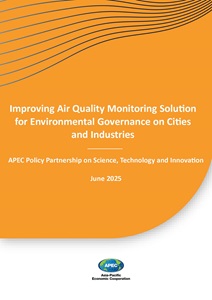
Reports
APEC Regional Trends Analysis, October 2025
The Asia-Pacific Economic Cooperation (APEC) is a regional economic forum established in 1989 to leverage the growing interdependence of the Asia-Pacific.
The Asia-Pacific Economic Cooperation (APEC) is a regional economic forum established in 1989 to leverage the growing interdependence of the Asia-Pacific.
APEC ensures that goods, services, investment and people move easily across borders. Members facilitate this trade through faster customs procedures at borders; more favorable business climates behind the border; and aligning regulations and standards across the region.
APEC ensures that goods, services, investment and people move easily across borders. Members facilitate this trade through faster customs procedures at borders; more favorable business climates behind the border; and aligning regulations and standards across the region.
APEC works to help all residents of the Asia-Pacific participate in the growing economy.
APEC works to help all residents of the Asia-Pacific participate in the growing economy.
Capacity building projects play an important role in helping translate APEC's goals into reality.
Capacity building projects play an important role in helping translate APEC's goals into reality.

Reports
•June 2025
Download Report
3MB
Published Under
SOM Steering Committee on Economic and Technical Cooperation (SCE), Policy Partnership on Science, Technology and Innovation (PPSTI)
Accessed
452
Pages
41
This report, developed under the APEC project PPSTI 208 2023A, focuses on advancing air quality monitoring solutions to strengthen environmental governance in urban and industrial contexts across the APEC region. Led by the Industrial Technology Research Institute (ITRI), the project emphasizes the application of smart technologies—such as the Internet of Things (IoT), artificial intelligence (AI), unmanned aerial vehicles (UAVs), and cloud-edge computing—to enable real-time, cost-effective, and scalable monitoring systems. Through case studies in member economies, including Indonesia, Japan; Malaysia; the Philippines; and Chinese Taipei, the report showcases successful models of low-cost sensor deployment, automated enforcement mechanisms, and integrated data platforms. A cross-economy survey highlights common priorities and challenges, particularly the need for affordable solutions and regulatory alignment. The report concludes with policy recommendations advocating for integrated digital governance, enhanced regulatory frameworks, greater public data transparency, and regional collaboration to promote sustainable, inclusive, and data-driven air quality management throughout the APEC region.

